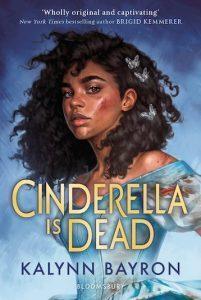“Cinderella has been dead for two hundred years. I’ve been in love with Erin for the better part of three years. And I am about two minutes away from certain death.”
It’s time to smash the fairytale glass ceiling.
Cinderella Is Dead is Kalynn Bayron’s eighth novel but the first to reach critical acclaim. Published in 2020, it covers a broad range of crucial issues that need to be addressed in the modern world. From sexism to racism to LGBT+ rights, this book kicks oppression in the face.
It rightfully became an immediate success, and has won numerous awards: 2020 Book Shimmy Award for diverse books, 2020 Books Are My Bag Readers Award for young adult fiction and 2020 Wordery’s Book Of The Year Award for children’s books.
Summary
The story follows Sophia Grimmins in the beautiful faraway world of Lille where young girls read the romantic tale of Cinderella every night. It’s all a lie. The tyrant king forces teenage girls to appear at the Annual Ball every year in order for the men of the kingdom to choose a wife. Failure to be selected means instant death. Sophia has been in love with her best friend for years and wants nothing more than to run away with her and escape the diabolical king’s rule. When her first ball takes a turn for the worse, she just might get her chance. Then she meets Constance, the last known descendant of Cinderella’s “evil” stepsister. But the story is not as it appears, and there is more to Cinderella’s story than Sophia ever knew. It’s time to get that fairytale ending once and for all.
Commentary
Cinderella Is Dead is without a doubt one of the best minority respresenting novels I have ever read.
Praise
- The entire basis of the novel is sexism. The king forces young girls to parade themselves in front of men, the men themselves choose whichever girl they like to marry, and the majority of women are ignored and beaten by their husbands. Although set in a fantasy world, it’s not all that different from some countries today. Cinderella Is Dead addresses these issues as Sophia and Constance attempt to tear down the patriarchy in the most explosive way possible.
- LGBT+ representation, anybody? Not only is the main character queer, but the second, third, and fourth main characters are as well. This novel is fully centered on two girls who fall in love as they bring the kingdom to its knees.
- The main character is black, and the secondary main character is a person of colour as well. This representation is not only incredibly important but beautifully done as well. These aren’t token POC’s thrown in to tick all the boxes, this is unapologetically diverse and could not have been written any better.
Critique
- The ending is abrupt and somewhat unsatisfactory. Without giving away any spoilers, be aware that the most important battle of the novel is only a handful of pages long. They prepare for battle, they create a plan, and then, suddenly, just like that, it’s over. There is a sense of closure in the epilogue, but the final chapter is too abrupt to be fully enjoyable.
- The villain is cartoonish. The king is a dictator and a tyrant and generally Not Good, but there’s something almost comical in how he acts. He’s quick to anger, impossibly easy to annoy, and when it comes to a fight between a 16-year-old girl and an adult man, it really shouldn’t be that easy.
- Although there is a wlw relationship in the novel, it’s not the most realistic. Sophia’s main motivation for trying to bring down the king is her love for Erin. They’ve been best friends since childhood, and Sophia is willing to risk death just to make her happy. And yet, once Constance comes along, it’s suddenly “Erin who?” Sophia disregards their relationship a little too easily and is far too quick to fall in love with a complete stranger.
Recommendations
Overall, I’d give Kalynn Bayron’s Cinderella Is Dead a four out of five. It’s an incredible take on the stereotypical damsel-in-distress fairytale that all children unfortunately read. It’s diverse and teaches many crucial life lessons throughout, despite its somewhat flat characters.
I’d recommend this novel to absolutely everyone, but especially for younger children. It’s about damn time that we tell little girls multi-racial, LGBT+ inclusive, feminist fairytales, instead of “all women need to be saved by men”.

Want to read it for yourself?
Prefer to listen instead?
